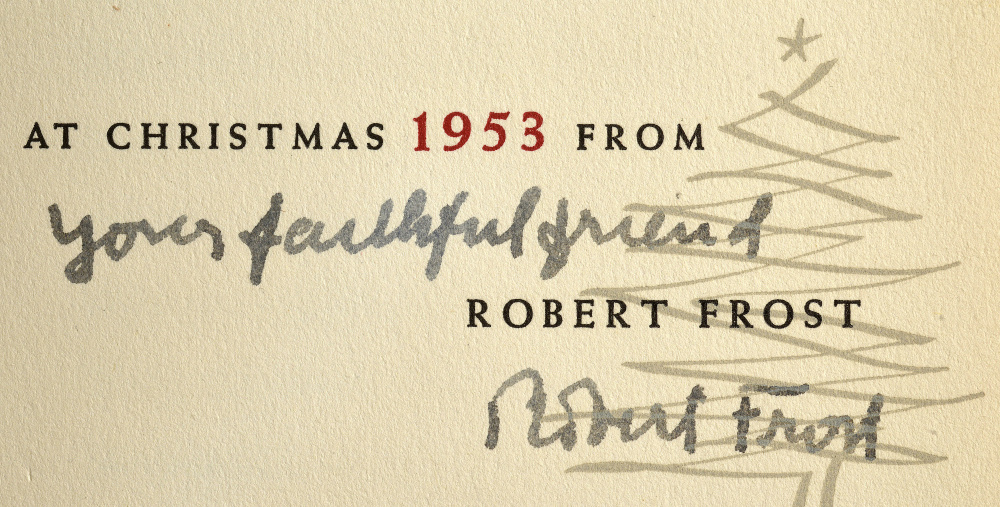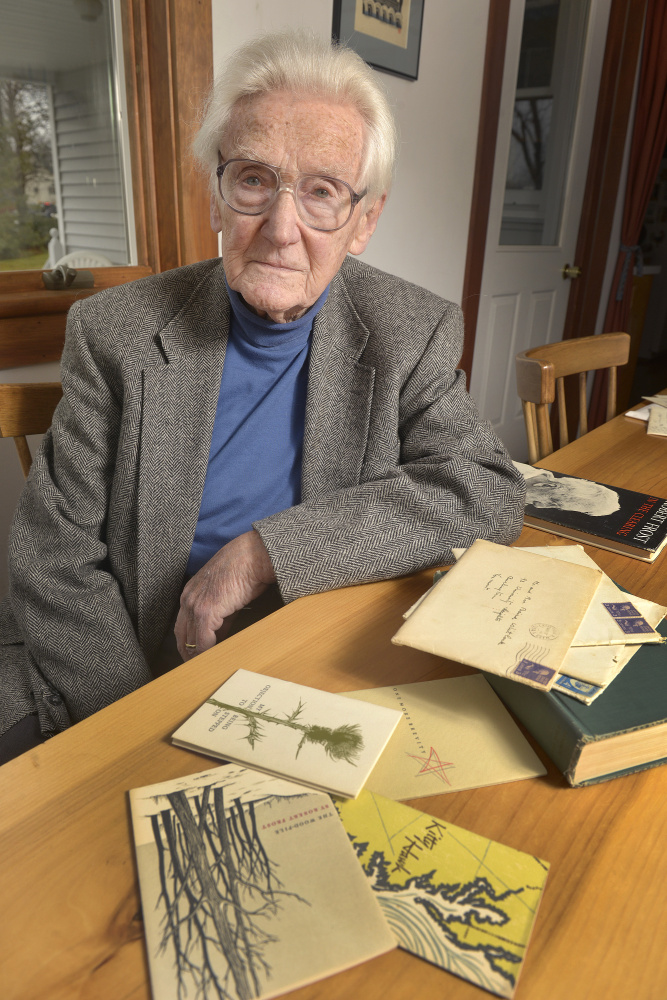BELFAST — Soon after he began teaching at Middlebury College in Vermont, Baird Whitlock received an invitation from an English department colleague.
“Would you like to meet Robert Frost?”
An aspiring professor of English, Whitlock couldn’t imagine meeting anyone more prominent. This was in 1949, and by then Frost had received four Pulitzer Prizes for his poetry, and was a beloved if sometimes misunderstood American writer. He lived not far from Middlebury, in a cabin in the woods.
His friend warned Whitlock that Frost didn’t take kindly to pandering. Don’t talk to him about poetry, he advised. Talk to him about teaching or hiking in the mountains.
The meeting went well and Whitlock became friendly with Frost. For a dozen years, Frost sent Whitlock a personalized Christmas greeting in the form of a poem, published as a chapbook. These were private poems, sent as Christmas cards to friends, family and professional acquaintances. His last, sent in December 1962, went out to about 1,800 people.
Whitlock, now 91 and living in Belfast, saved those greetings, which Frost signed and personalized. At 4 p.m. Sunday, Whitlock will share them at Left Bank Books in Belfast, where he will talk about his friendship with Frost and recite some of the poems.
“Each poem except for one was a new one, and they give a range of feelings that is typically Frostian,” Whitlock said. “They also reveal his reactions to the changes of his life as he was welcomed and praised at an increasingly worldwide level while at the same time being beset with physical problems due to his approach to his 90s.”
BRUSHES WITH GREATNESS
Frost died in January 1963 at age 88. In addition to winning multiple Pulitzers, he received a Congressional Gold Medal and recited a poem at the inauguration of President John F. Kennedy in January 1961. He is remembered for writing some of the most recognized lines in American literature, including “But I have promises to keep, and miles to go before I sleep” from the poem “Stopping by Woods on a Snowy Evening.” Although he was born in California, Frost spent much of his life in rural Vermont. His poems evoke New England life, man’s place on Earth and his views on a changing world.
Whitlock moved around quite a bit in his early teaching career, and Frost obliged him as a classroom guest, talking to students about writing. When Whitlock taught at Colby College in Waterville, he persuaded Frost to give the commencement address in 1956.
Frost printed the holiday greetings in booklet form, usually with an illustrated cover. Whitlock received his first in 1951, when he lived in Scotland. Whitlock had left his teaching job at Middlebury the previous summer and was working on his doctorate about the poetry of John Donne.
The printed greeting on Frost’s poem read, “At Christmas 1951 a new poem/comes to you with Holiday Greetings/from Robert Frost.” Between the first two lines, Frost personalized it for Baird, inserting the words “about your native land.” The poem, “A Cabin in the Clearing,” used a metaphor of smoke rising from a remote chimney on a damp day to celebrate America’s sense of identity and its unique place in the world.
By 1953, Whitlock was back in Vermont with both his degree and a wife, Joan. “Frost approved heartily of my good fortune – the wife, not the degree,” Whitlock said. “And for the decade from that year, the cards were always addressed to both of us.”
The Whitlocks grew so fond of Frost, they named their third son after him.
They moved to Belfast nearly 30 years ago, after Whitlock retired from teaching. But his retirement was in name only. He helped establish the Senior College at Belfast, where he taught English, poetry and art history. His academic career included the presidency of Bard College at Simon’s Rock and professorships at colleges from Colby to the University of Hawaii.
‘WORRIES ABOUT AMERICA’
Whitlock is considered Belfast’s Renaissance man, said Left Bank Books co-owner Lindsay McGuire, who anticipates a full house at Sunday’s event.
He plans to use the Frost holiday greetings as a structure for a larger discussion about the poet. Frost’s holiday poems reflected his perspective of the world and his faith in nature – themes he explored throughout his life.
As with nearly all the poems that Frost wrote for the public, his private Christmas poems are open to the interpretation of the reader. Frost creates a framework around which the reader can draw conclusions, Whitlock said.
“Kitty Hawk,” which he sent in 1956, wraps tapestries of American history together, touching on the drowning of Aaron Burr’s daughter and the spirit of America. “Kitty Hawk, O Kitty,/Know you no dismay,/But some time in some/Mood akin to pity/You would weep no less/For mankind’s success/Than for their distress.”
“I think most are about America and his worries about America losing its individuality and losing the promise that it had,” Whitlock said.
America was still a young country in the mid-20th century, emerging as a world leader. “Mistakes were possible without being devastating,” he said. “We could be excused. I don’t think that happens anymore. When we make a mistake now, the whole world has a different view.”
If Frost were alive today, Whitlock believes the poet would allow his love of the natural world to guide his thoughts to a better place. He loved being in the mountains of Vermont, Whitlock said.
“He got so much pleasure out of the small things. That’s what he would focus on – the good people who inhabit the Earth, and the natural world. Those are things that were most important to him.”
ROBERT FROST’S ‘A CABIN IN THE CLEARING’ (1951)
MIST
I don’t believe the sleepers in this house
Know where they are.
SMOKE
They’ve been here long enough
To push the woods back from around the house
And part them in the middle with a path.
MIST
And still I doubt if they know where they are.
And I begin to fear they never will.
All they maintain the path for is the comfort
Of visiting with the equally bewildered.
Nearer in plight their neighbors are than distance.
SMOKE
I am the guardian wraith of starlit smoke
That leans out this and that way from their chimney.
I will not have their happiness deprived of.
MIST
No one – not I – would give them up for lost
Simply because they don’t know where they are.
I am the damper counterpart of smoke
That gives off from a garden ground at night
But lifts no higher than a garden grows.
I cotton to their landscape. That’s who I am.
I am no further from their fate than you are.
SMOKE
They must by now have learned the native tongue.
Why don’t they ask the Red Man where they are?
MIST
They often do, and none the wiser for it.
So do they also ask philosophers
Who come to look in on them from the pulpit.
They will ask anyone there is to ask –
In the fond faith accumulated fact
Will of itself take fire and light the world up.
Learning has been a part of their religion.
SMOKE
If the day ever comes when they know who
They are, they may know better where they are.
But who they are is too much to believe –
Either for them or the onlooking world.
They are too sudden to be credible.
MIST
Listen, they murmur talking in the dark
On what should be their daylong theme continued.
Putting the lamp out has not put their thought out.
Let us pretend the dew drops from the eaves
Are you and I eavesdropping on their unrest –
A mist and smoke eavesdropping on a haze –
And see if we can tell the bass from the soprano.
Than smoke and mist who better could appraise
The kindred spirit of an inner haze.
Send questions/comments to the editors.





Success. Please wait for the page to reload. If the page does not reload within 5 seconds, please refresh the page.
Enter your email and password to access comments.
Hi, to comment on stories you must . This profile is in addition to your subscription and website login.
Already have a commenting profile? .
Invalid username/password.
Please check your email to confirm and complete your registration.
Only subscribers are eligible to post comments. Please subscribe or login first for digital access. Here’s why.
Use the form below to reset your password. When you've submitted your account email, we will send an email with a reset code.